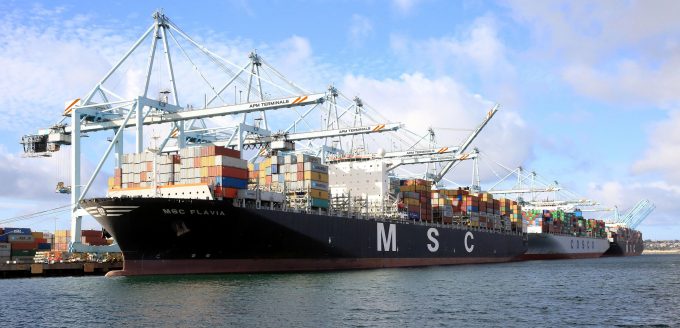WSC appoints Soren Toft and Randy Chen as new chair and vice chair
MSC boss Soren Toft and Randy Chen, vice chairman of Wan Hai, have become chair ...
FDX: ABOUT USPS PRIVATISATIONFDX: CCO VIEWFDX: LOWER GUIDANCE FDX: DISRUPTING AIR FREIGHTFDX: FOCUS ON KEY VERTICALFDX: LTL OUTLOOKGXO: NEW LOW LINE: NEW LOW FDX: INDUSTRIAL WOESFDX: HEALTH CHECKFDX: TRADING UPDATEWMT: GREEN WOESFDX: FREIGHT BREAK-UPFDX: WAITING FOR THE SPINHON: BREAK-UP ALLUREDSV: BREACHING SUPPORTVW: BOLT-ON DEALAMZN: TOP PICK
FDX: ABOUT USPS PRIVATISATIONFDX: CCO VIEWFDX: LOWER GUIDANCE FDX: DISRUPTING AIR FREIGHTFDX: FOCUS ON KEY VERTICALFDX: LTL OUTLOOKGXO: NEW LOW LINE: NEW LOW FDX: INDUSTRIAL WOESFDX: HEALTH CHECKFDX: TRADING UPDATEWMT: GREEN WOESFDX: FREIGHT BREAK-UPFDX: WAITING FOR THE SPINHON: BREAK-UP ALLUREDSV: BREACHING SUPPORTVW: BOLT-ON DEALAMZN: TOP PICK

The US Federal Maritime Commission (FMC) has approved the Maersk Line and MSC (2M Alliance) cooperation agreement with Hyundai Merchant Marine (HMM), effective tomorrow, but with a proviso on shipper safeguards.
Commissioner William Doyle said: “Maersk confirmed this week it would honour its commitment to shippers as to having a say on the vessels their cargo will be loaded onto. I expect MSC to afford some measure of protection for its shippers as well.”
After signing the strategic cooperation agreement with HMM in December – which is still subject to creditor restructuring – and following shipper concerns, Maersk said 2M cargo would only be loaded onto HMM vessels “with customers’ express agreement”.
It added this would be “only on the HMM-operated service that is part of the Asia to US west coast slot swap agreement. These HMM services are not part of the 2M network today”.
At the time MSC issued a statement which said: “The agreement primarily sees Hyundai purchasing slots on 2M vessels with the 2M partners also purchasing a number of slots with Hyundai on selected routes… the detail of the agreement, its structure and guarantees have been carefully considered with this in mind.”
Mr Doyle said: “Maersk’s statement was widely interpreted as a response to shippers’ concerns in the wake of the Hanjin insolvency – meaning that having shippers take affirmative action on which carrier is ultimately used was viewed as a safeguard for those wary of having containers on a HMM vessel.
“MSC’s statement provided no shipper option to exclude carriage on the HMM services.”
However, MSC subsequently told The Loadstar: “We have responded to the FMC regarding their concerns, and we are pleased that the agreement has now been approved.
“MSC is committed to providing shippers clear and transparent communications, including when slot purchases, exchanges or VSA’s are involved.
“It will normally be apparent to customers when the booked vessel is not a MSC vessel, and we will always do our best to keep customers informed if vessel is changed.”
In allowing the agreement, just ahead of the formation of new alliance structures on Saturday, Mr Doyle said the FMC would “continue to have the authority to monitor this and other agreements for compliance with the law”.
Maersk, MSC and HMM signed a cooperation agreement on 16 March for an initial two-year period, although it is understood that the 2M partners can terminate the agreement without cause before 1 October 2018.
At the signing ceremony in California, HMM chief executive Yoo Chang-keun said: “We believe that all three partners will strengthen competitiveness through this strategic cooperation.”
He added that through the cooperation HMM could “acquire a more stable basis of profit improvement by utilising 2M’s competitive networks and mega-vessels”.
However, according to Alphaliner, the deal “will impose restrictions on HMM that will limit the carrier’s ability to grow on east-west routes”.
The consultant said HMM was required to consult with the 2M partners “prior to introducing any new services or cooperating with other carriers” on the transpacific, which included slot sales or exchanges.
Saturday will see HMM launch three standalone transpacific services, deploying 6,600 teu ships on which the 2M partners will have an allocation.
Elsewhere, after the supply chain chaos caused by the sudden receivership of Hanjin Shipping last August, THE Alliance has built into its vessel-sharing agreement a contingency fund to be triggered that would enable ships to be berthed and cargo to be discharged in the event of the bankruptcy of one of its members .
According, to alliance member Hapag-Lloyd’s chief executive, Rolf Habben Jansen, the safeguard was included “in response to customer feedback”.
Mr Doyle concluded: “Shippers should review their options with all ocean carriers: make sure you know which actual ocean carrier vessel will carry your goods.”
This article was amended on 30 March to include a response from MSC.
Comment on this article